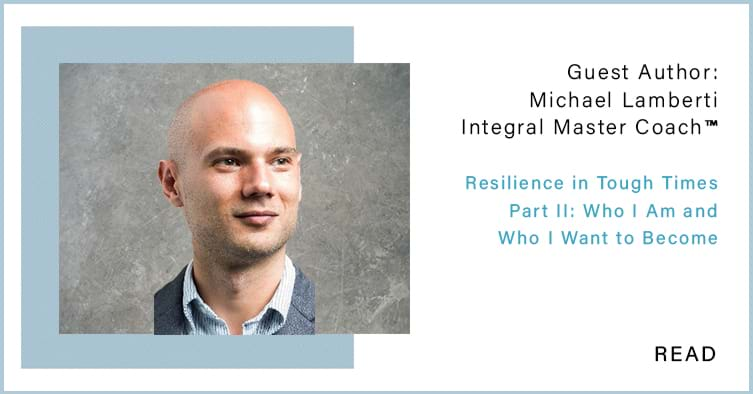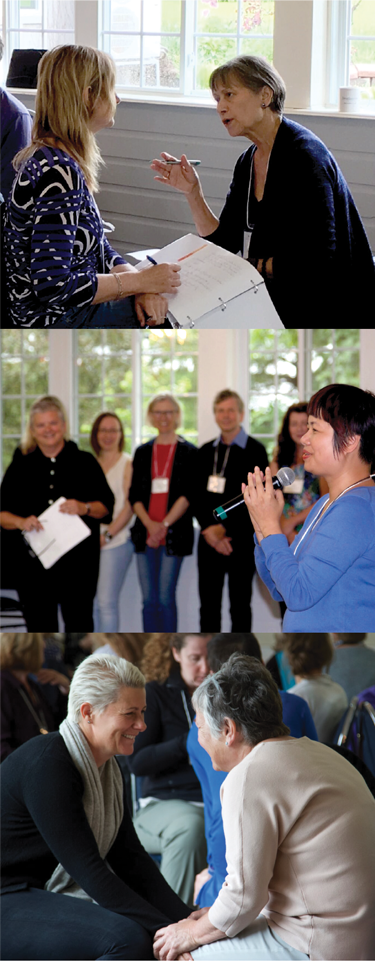

Resilience in Tough Times Part II: Who I Am and Who I Want to Become

In this article, I’ll share an area of my life where I still don’t feel resilient, as well as how I’m working on developing capacities for resilience in this area.
There is a mutually supportive relationship between resilience and development. Resilience is cultivated through development, while the process of development requires resilience. Holding resilience as something I can develop enables me to be honest about the times, places, and situations where I still need further development. And I’ve learned through the ICC Integral Coaching® approach that these times, places, and situations are excellent opportunities to build the kind of resilience needed for development. This can be done by holding the dynamic tension between who we are and who we want to become with honesty and heart.
Right now, the facet of myself I am most called to develop is my way of trying to hide my sensitivity from the people around me. When I’m trying to keep emotions from surfacing in front of others, I experience a low level of capability to meet and respond to each moment as it arises. Instead of saying or showing how I feel, I say and do as little as possible. And I take the first chance I get to inconspicuously retreat into solitude to process my feelings where they can’t be seen.
This way of (not) reacting has closed down a lot of possibilities in my life. It’s created strain and distance in my intimate relationships, as hiding something from a significant other tends to do. Conflicts have gone unresolved or unacknowledged so I can avoid feeling like I have to endure criticism without flinching. A similar avoidance has also kept me from seeking greater prominence as a coach, for fear that more business and publicity results in more opportunities to be somehow unmasked and revealed.
When a long-term relationship ended suddenly some years ago, I had to cope with the natural feelings that accompany a break-up: pain, anger, hurt, grief. I also had to cope with not wanting anyone to see me in this kind of turmoil. Not my former partner, not my family, not my friends. No one. I figured it was okay to talk about it and be openly hurt for a week or two, but after that, I believed everyone would expect me to have “moved on,” and I felt I’d damn well better meet those expectations. Instead of leaning on the support of others through the primary crisis of the break-up, I’d created what felt like a secondary crisis of needing to run damage control and a stringent PR campaign to convince people I was fine.
I suppose the obvious moral of a story like that is something like, “Trust the people around you, and don’t be afraid to be yourself.” That’s decent enough advice, but I learned from the ICC coaching approach how much a tidy insight like that elides the many different capacities that are necessary to trust others and be yourself. Discerning who is trustworthy, being able to name how I feel, and being able to articulate those feelings to others are just some of the necessary capacities. And every person is going to have different levels of skill in those areas depending on their unique personality and what skills life did and did not require them to learn and develop in order to make it to this point in time.
The ICC Method has given me a framework to respect and honour where everyone is at, including myself. I know my long-held belief that I should be able to hold my feelings in and go through life appearing impervious to hurt is unrealistic, and that the pursuit of it is exhausting and fruitless. And I can also honour the fact that my life unfolded in such a way that not showing emotion was once a crucial skill that kept me safe in educational and corporate environments. I have simply reached a point where it now interferes in my life more than it helps.
In this specific aspect of my life, developmentally, I am in a middle place, a place that ICC Co-Founder Joanne Hunt describes as the dynamic tension between, “the me that I have been right up to this moment in time. The who I’ve been.” And the “who I’m longing to become […] so I can carry out the things that matter to me with the capacities that I need.” Joanne goes on to point out that, “You actually have to develop quite a lot of resilience to hold ‘oh, there I am again’”. In my case, it takes resilience for me to notice my habit of clamming up emotionally again and again and again. It also takes resilience to patiently develop the capacities I need to behave differently instead of berating myself for “being like this” and passively wishing I was different.
I have been building a couple of key capacities that I need to be able to grow into the person I am longing to become. In support of you learning from my developmental journey, I would like to share a specific capacity I have been patiently building in this area as well as provide you with a practice you can use to build it too. It has been a big help in my journey to be more able to express my sensitivity and vulnerability to the people I’m close to, so that I have a strong support system in tough times and can hold the perceptions of others more loosely. The specific capacity I have been building in order to actually express my sensitivity and vulnerability to others is the capacity to be more able to discern who it is safe to open up to emotionally.
Discerning who to open up to, just a few people at a time, feels like a necessary component of being more able to express sensitivity and vulnerability, and it feels like something that is a doable developmental step given my current capacity levels. In order to develop and strengthen this skill, I designed a daily practice from an exercise in Julia Cameron’s brilliant The Artist’s Way. I offer it to you as a practice to engage in if you are looking to build capacity around vulnerabity and self-expression as I am. It is also a good practice for anyone looking to gain more clarity around their interactions with others.
Like it? Share it!





 Download
Download Share
Share


